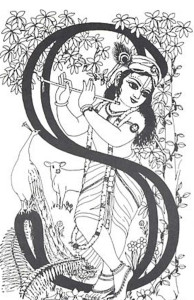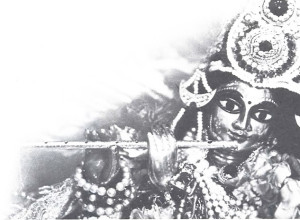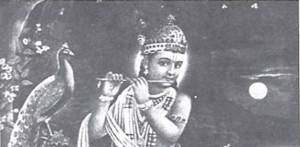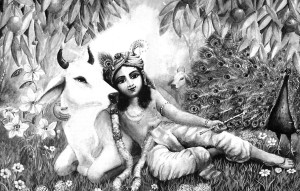Jayadvaita dasa
 Sometimes just a few carefully chosen words can change our whole outlook. We may have had the experience of hearing or reading even a short passage of poetry or prose that carries such deep import that it touches the heart and moves us to act. A powerful slogan can influence millions of people to rally in support of a political cause, and the mention of a girl’s name may trigger a flood of poignant memories.
Sometimes just a few carefully chosen words can change our whole outlook. We may have had the experience of hearing or reading even a short passage of poetry or prose that carries such deep import that it touches the heart and moves us to act. A powerful slogan can influence millions of people to rally in support of a political cause, and the mention of a girl’s name may trigger a flood of poignant memories.
Transcendental sound acts in a similar way, but in relationship to the spirit soul. We have a very intimate and loving relationship with the Supreme Person, Krsna, but somehow (inexplicably) we’ve forgotten this relationship in the endless complications of time. When we hear the transcendental sound “Krsna,” our memory is gradually revived. Say this sound to yourself: Krsna.
The soul is like a sleeping man. When a man sleeps at night, he forgets his real life to wander in a world of dreams. Similarly, the soul has a real life of eternal bliss and knowledge, but when the soul falls asleep, he wanders in the dreamland which we now call “the real world.” As a sleeping man can be called back to consciousness when he hears the sound of his name, so the dormant spirit soul is stirred to transcendental life by the vibration of the name Krsna.
Hare Krsna is a transcendental sound. We do not need to make any mental or intellectual adjustments to understand it. Simply by chanting, one can understand what chanting is. The sweet feeling that devotees of Krsna relish by chanting Hare Krsna is like the taste of honey. The only way to appreciate the taste of honey is to taste it, and similarly the way to appreciate the transcendental sound Krsna is to chant it. We can write doctoral theses about honey or chemically analyze it, but if we want to understand it we have to taste the honey itself. Speculating about Krsna is like licking a bottle of honey—one must open the bottle and taste the honey itself, not just lick the jar.
Devotees of Krsna take great pleasure in chanting the name of Krsna and in describing His transcendental form, qualities and pastimes. This is described in Bhagavad-gita, where Lord Krsna says, “My devotees derive great transcendental satisfaction and bliss from enlightening one another and conversing about Me.” Krsna is the reservoir of pleasure, and pure devotees of Krsna are always swimming in this transcendental reservoir.
Only Krsna can fully satisfy the spirit soul because the soul craves an eternal relationship. If we have a sweet relationship with someone, we do not want it to end. We want the love we treasure to go on and on. “A diamond is forever.” But in the material world all relationships, no matter how sweet, must come to an end, just as dreams do. Friends, relatives and lovers are brought together for some time and then separated again, like seaweed in the ocean or chessmen on a playing board.
Chanting Hare Krsna can give us real satisfaction because it revives our eternal relationship with Krsna. It is not mechanical or ritualistic. Our love for Krsna is sleeping, but the transcendental vibration of Hare Krsna knocks on the door of the heart and arouses this dormant love. This love, when awakened, is vibrant, alive personal. It is not theoretical or scholastic. The devotee of Krsna if filled with appreciation of the beauty of Krsna, the mercy of Krsna, the greatness of Krsna and all of Krsna’s transcendental qualities, and therefore he is absorbed in love of Krsna, and he wants to serve Him forever and glorify Him constantly.
Just as a code word can revive distant memories by reference to a context, so there are different transcendental stimuli which can potently act to revive our dormant Krsna consciousness. The most important of these stimuli are hearing and chanting about Krsna.
 If one hears about Krsna from a pure devotee of Krsna, he can become enlightened in Krsna consciousness. A pure devotee always speaks on the basis of authoritative scriptural references, end because he has personally realized the subject matter, when he speaks the audience is infused with transcendental inspiration. Hearing about Krsna from scholars or professional reciters will not produce the same effect. One should hear about Krsna from the right person.
If one hears about Krsna from a pure devotee of Krsna, he can become enlightened in Krsna consciousness. A pure devotee always speaks on the basis of authoritative scriptural references, end because he has personally realized the subject matter, when he speaks the audience is infused with transcendental inspiration. Hearing about Krsna from scholars or professional reciters will not produce the same effect. One should hear about Krsna from the right person.
On the transcendental platform, there is no difference between Krsna and His name or His glories. Materially, this is not so. If we say the name “water,” the name alone is not enough to quench our thirst. The name water and the substance water are different. But there is no difference between the name Krsna and the person Krsna. Krsna is personally present when we chant His names.
This is a matter of realization. Krsna is present in His name, but we have to realize it. This realization is not cheap, but it will come to one who sincerely chants Hare Krsna. It is gradual. The first symptoms of such realization are a feeling of bliss and an urge to dance along with the chanting. Gradually, by chanting, the devotee feels the personal presence of Krsna more and more. The devotees of the Hare Krsna movement chant Hare Krsna all day long, and there are many devotees who have been in the movement for several years. They always chant the name Krsna over and over, but they do not feel boredom or monotony. They feel ever-increasing transcendental bliss, and this is why they keep chanting. Discussion about Krsna is also not different from Krsna. By hearing talks about Krsna, one will gradually realize the presence of Krsna. By hearing about Krsna one becomes blissful and enlightened in Krsna consciousness.
Topics about Krsna are an ocean of bliss, ano the depth of that ocean is unlimited. Since Krsna is unlimited, His name, form, qualities and pastimes are also unlimited. That is why Krsna consciousness is the profoundest philosophy in the world. Once Lord Caitanya was explaining a verse from Srimad-Bhagavatam, a Vedic literature that describes the pastimes of Krsna, and for one word alone He gave sixty different explanations. “Srimad-Bhagavatam is the representation of the Supreme Lord Krsna,” He explained. “Therefore Srimad-Bhagavatam is not different from Krsna. So, as Krsna is unlimited, similarly in each word and each letter of Srimad-Bhagavatam there are unlimited meanings, and one can understand them by association with devotees.”
When we hear about Krsna in association with devotees, we begin to realize that we have a relationship with Krsna. This realization comes from Krsna Himself. Krsna is in the heart of everyone, and when He sees that someone is sincerely hearing about Him in association with devotees, from within He purifies the hearer and bestows upon him transcendental knowledge and bliss. If we could travel at the speed of the mind for thousands of years, still we could not reach Krsna by mental speculation. Krsna cannot be conquered by the mind. But Krsna is pleased to reveal Himself to a sincere devotee.
 “Krsna freely moves with His friends as a cowherd boy in Vrndavana.” This is just one line from Teachings of Lord Caitanya, a book on the science of Krsna by our spiritual master, His Divine Grace A.C. Bhaktivedanta Swami Prabhupada. By casually reading these words once, we may not catch anything beyond the ordinary, but if we examine them carefully, we will find a wealth of transcendental knowledge about God that has not previously been available to us.
“Krsna freely moves with His friends as a cowherd boy in Vrndavana.” This is just one line from Teachings of Lord Caitanya, a book on the science of Krsna by our spiritual master, His Divine Grace A.C. Bhaktivedanta Swami Prabhupada. By casually reading these words once, we may not catch anything beyond the ordinary, but if we examine them carefully, we will find a wealth of transcendental knowledge about God that has not previously been available to us.
Krsna means God, but the name means more than that. “God” is a title, like President. God is the supreme controller. Everyone is a controller to some extent—we control our children, our wife, our friends, or a cat or dog—and the supreme controller, who controls everyone else, is called God. But God has a name also, just as the President has a name. If we know the chief executive as “Mr. President,” this is certainly a relationship with the President, but his intimate associates know him on a first-name basis. “President” is the post, but ultimately the President is a person.
So although Krsna is God, the conception of Krsna is higher than that of God. The word “God” only refers to a fragment of His opulence. Knowledge of Krsna is higher knowledge because Krsna means “All-attractive.”
How is He all-attractive? He is the most beautiful, the most strong, the most famous, the most wealthy, the most renounced and the most intelligent of all persons. He can attract the whole world by His transcendental pastimes.
God is the controller of everything, but His main business is enjoyment. God is the supreme enjoyer. How does He enjoy? Simply by His desire He has expanded an entire spiritual world, where everything is blissful and eternal. This spiritual abode is called Goloka Vrndavana.
 Goloka Vrndavana is a planet in the spiritual world, and it is shaped like a gigantic lotus flower. In Vrndavana there are beautiful trees and fields and lakes and rivers. The houses are made of spiritual gems, there are thousands of cows grazing in the fields, and there are beautiful birds like swans, cuckoos and peacocks.
Goloka Vrndavana is a planet in the spiritual world, and it is shaped like a gigantic lotus flower. In Vrndavana there are beautiful trees and fields and lakes and rivers. The houses are made of spiritual gems, there are thousands of cows grazing in the fields, and there are beautiful birds like swans, cuckoos and peacocks.
These descriptions are not fanciful or imaginary. They are taken directly from Vedic literatures.* The same Vedic literature which includes the exalted philosophical analyses of the Vedanta-sutra also includes these transcendental descriptions of the spiritual world. The followers of the Vedic principles accept these descriptions as factual on the basis of standard authority.
* cintamani-prakara-sadmasu, etc.
God does not live in a congested metropolis with cars, factories and subways. He lives on an eternal planet shaped like a lotus flower amidst gardens of fruits and flowers. And He is not an old man with a beard, as some people have imagined. Why should God be old? The Vedic literatures inform us, adyam purana-purusam nava-yauvanam ca: “Although He is the oldest person, He has the eternal form of a fresh youth.” He is eternally a sixteen-year-old boy.
Krsna, the ocean of the eternal beauty of youth, moves in waves of beauty. His transcendental body never deteriorates, since the Lord is above the jurisdiction of time. His body is of a spiritual dark blue color, and His palms and the soles of His feet are reddish. His feet are so beautiful that they are compared to lotus flowers, and His ankles are decorated by jeweled anklets that jingle as He walks. His dress is bright yellow, like lightning, and He wears a beautiful pearl necklace. A fragrant flower garland decorates His body. In His hands He holds a flute, and by playing on this flute He can attract the minds of all living entities. His face is compared to the moon, and on His head He always wears a peacock feather. His transcendental form is the eternal reservoir of all beauty; from His beauty all other beautiful things emanate.
Krsna plays as a cowherd boy. The Supreme Lord is the supreme controller of the material and spiritual worlds. The sun, the moon and all the planetary systems spin in their orbits under His supervision, as do even the atomic particles. Time, space and activity are all under His control. Everything rests on Him, as pearls are strung on a thread, and not a blade of grass moves without His sanction. But for enjoyment the Lord has invented transcendental informal pastimes as a cowherd boy. He enjoys herding the cows, playing His flute, and playing in the fields with His friends. He gives pleasure to the land, the cows and the senses of all living entities, and therefore He is also called Govinda.
God is not impersonal. He has a form, a name, a home, friends and pastimes, but these are all unlimited. The impersonal idea is arrived at by negative reasoning in the absence of positive knowledge. The impersonalist reasons, “Man has a body, but that body is limited and temporary. So God cannot have a body. Man has a name, but that name is a designation. So God must be nameless.” In this way he arrives at the conclusion that God is a formless, nameless, senseless being without qualities and pastimes. In this way the impersonalist, due to a poor fund of knowledge, misses out on the nectar of spiritual life.
The impersonal conception is the beginning of spiritual life, but advanced understanding is personal. In the beginning, by speculation, one can come to understand that God must have no material limitations, such as material form, material name or material qualities. But why should He not have spiritual form, a spiritual name and spiritual qualities? He does.
To say that God is unlimited and then to say that He cannot be a person is contradictory. If God is unlimited, why can’t He be a person? He can do whatever He wants. Everyone else is a person—why should God be impersonal? If He is impersonal, how from Him have so many persons come? God must be a person, but He is not a person like us. His name, fame, qualities and pastimes are all blissful, eternal and full of knowledge.
God in His personal form cannot be understood by speculation or hypothesis. Detailed information of the Personality of Godhead can only be understood by hearing it from authorities in disciplic succession. Such knowledge comes down to us by a descending process. Originally God revealed Himself to Brahma, the first created person, and he transmitted this knowledge to his disciple Narada, who transmitted it to his disciple, and in this way the knowledge is passed down intact. It is like the ripe fruit of a tree—if it is handed down carefully from hand to hand from the top of the tree, then it will reach the ground intact, and one can relish the juice. In this way, His Divine Grace A.C. Bhaktivedanta Swami Prabhupada is the present representative of an unbroken line of disciplic succession. His teachings do not deviate from those of the previous spiritual masters, and one can verify this claim by consulting the revealed scriptures given by Brahma and others in the line.
Everyone should be captivated by the personal features of Krsna and thus become perfect. It is a simple, gradual process. It begins when one starts hearing about Krsna or chanting Hare Krsna or rendering some small service. Gradually, in this way, one’s relationship with Krsna is revived, and it develops more and more, until—in the perfectional stage—one can become a personal associate of Krsna’s in the spiritual world.
This is the position of Krsna’s friends. They are all perfect in Krsna consciousness because they are totally in love with Krsna. Krsna’s friends have no interest other than Krsna. He is their life and soul. And, in reciprocation, Krsna gives Himself fully to His friends. These friends are all great devotees of the Lord who have become eligible to participate in Krsna’s pastimes due to their perfectional advancement in Krsna consciousness.
Krsna’s dealings with His friends are very confidential. Generally God is thought of with great awe and reverence and is worshiped by His devotees with great veneration and respect This is true even in the spiritual world.
Krsna appreciates this service very much, but for even greater enjoyment He likes some slack in the relationship. Krsna is very pleased when a devotee worships Him with awe and reverence, but He is pleased even more when these are dropped. Krsna’s friends in the spiritual world are so in love with Krsna that they do not even care that He is God. To them it doesn’t matter. They just know that He’s wonderful.
Krsna plays freely with them. They laugh and jump and play together in the fields. They enjoy herding cows, joking together, going on adventures and playing games. Sometimes Krsna and His friends play games, and Krsna loses and has to carry one of His friends on His shoulders.
Krsna and His friends are not ordinary cowherd boys. Krsna is the Supreme Personality of Godhead, and His friends are all great devotees. Krsna is realized as impersonal transcendental bliss by impersonalists, He is worshiped as the Supreme Lord by His devotees, and by mundane thinkers He is considered an ordinary human being. But the cowherd boys, after a huge accumulation of pious activities, are able to play with Him as His intimate friends.
The temporary friendship we know in the material world is just a dim, perverted reflection of the transcendental relationship between Krsna and His friends. Krsna’s transcendental activities are all eternal. Both Krsna and Krsna’s devotees in the spiritual world have eternal bodies that are full of bliss and never deteriorate. The eternal activities of Krsna and His friends are free from contamination by matter. There is no possibility of birth, death, disease or old age in the spiritual world.
Since everyone has an eternal relationship with Krsna, everyone can attain to the spiritual world if he is properly trained. If one can properly understand the science of Krsna under the guidance of a pure devotee of Krsna, a bona fide spiritual master, then he also can become a pure devotee, by the grace of the spiritual master, and can attain to the spiritual world and associate with Krsna. This perfection is practically inconceivable to us in our present state of forgetfulness of Krsna. No one can become an associate of Krsna simply by imagination, speculation or wishful thinking. But if one takes to the process sincerely, under the proper guidance, perfection is sure.
Krsna consciousness is perfect in the beginning and at the end. In the neophyte stage one can derive transcendental pleasure from chanting Hare Krsna, hearing about Krsna, eating spiritual food offered to Krsna, and offering service to a pure devotee of Krsna, and by this process, in the perfectional stage, one can come to serve Krsna directly in the spiritual world. The devotees of the Krsna consciousness movement are aiming for this transcendental goal.

What if we don’t find a spiritual master?
Will we not be able to reach Krishna if we don’t have a spiritual master?
Find Srila Prabhupada through reading his books… Prabhupada is the best spiritual master.